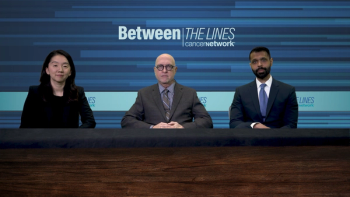Articles by David H. Ilson, MD, PhD

Panelists discuss how future analyses in advanced gastric cancer should assess long-term survival, real-world outcomes, biomarkers for response, resistance mechanisms, and patient selection for nivolumab plus chemotherapy. Evaluating these factors will optimize treatment strategies and confirm its role across diverse populations.

Panelists discuss how the 5-year survival data for nivolumab plus chemotherapy underscore its sustained efficacy as a first-line treatment, showing durable benefits over alternatives. Further research, including real-world evidence and broader clinical trials, is needed to validate its long-term impact across diverse patient populations and cancer subtypes.

Panelists discuss how balancing treatment intensity with quality of life remains a critical challenge in advanced gastric cancers (GCs) and how implementing biomarker-driven approaches such as PD-L1 combined positive score (CPS) testing faces practical hurdles in clinical settings. Key considerations include optimizing patient outcomes while managing adverse effects and addressing barriers such as testing accessibility, result turnaround time, and standardization of biomarker interpretation.

Panelists discuss how the adoption of immunotherapy-chemotherapy combinations in clinical practice requires careful consideration of both long-term safety profiles and sustained efficacy data. A 5-year follow-up period generally provides valuable insights into delayed adverse events and durability of response, which helps inform risk-benefit assessments. The balance between safety and efficacy should be evaluated on a patient-specific basis, considering factors such as performance status, comorbidities, and tumor characteristics.

Panelists discuss how the long-term follow-up data from CheckMate649 are crucial for understanding the durability of nivolumab plus chemotherapy’s benefit in first-line advanced gastric cancers (GCs)/gastroesophageal junction cancers (GEJCs). The survival outcomes help validate this regimen’s position as a standard of care, particularly for patients with PD-L1 combined positive score (CPS) ≥ 5. Although the magnitude of benefit varies by PD-L1 expression, both overall survival (OS) and progression-free survival (PFS) data inform personalized treatment decisions, with stronger evidence supporting immunotherapy use in higher PD-L1–expressing tumors while maintaining use across most patient subgroups.

Panelists discuss how the CheckMate649 study was a randomized trial that compared nivolumab plus FOLFOX (leucovorin, fluorouracil, oxaliplatin) chemotherapy with chemotherapy alone for treating advanced gastric cancer, gastroesophageal junction cancer, and esophageal adenocarcinoma. The study results found that nivolumab plus chemotherapy improved overall survival and progression-free survival compared with chemotherapy alone.

Panelists discuss how advanced gastric cancer treatments currently include surgery, chemotherapy (primarily platinum/fluoropyrimidine combinations), targeted therapies (trastuzumab for HER2-positive disease, ramucirumab), and immunotherapy (pembrolizumab and nivolumab in select patients). Despite these options, major unmet needs persist, with low survival rates, lack of predictive biomarkers beyond HER2, limited effective treatments after first-line therapy, poor response rates to immunotherapy, and high treatment toxicity affecting quality of life. Many patients also present with late-stage disease due to delayed diagnosis.

Dr. Krasna has written an overview of multimodality therapy in esophageal cancer, with a particular focus on aspects related to staging and surgical care. The optimal management of locally advanced esophageal cancer remains a subject of controversy and active debate. However, there is now a clear consensus that surgery alone is inadequate therapy for patients with T3 or node-positive disease.

Dr. Pohl and colleagues have provided a comprehensive and well written overview of the current landscape of targeted agents and chemotherapy in advanced colorectal cancer.

Esophageal cancer is a rare but highly virulent malignancy in theUnited States, and adenocarcinoma of the esophagus has had the mostrapid rate of increase of any solid tumor malignancy. Systemic metastaticdisease is present in 50% of patients at diagnosis. In the remaining50% presenting with local regional disease, systemic metastatic diseasewill develop in the vast majority of these patients.

The limited effectiveness of chemotherapy in esophageal cancerused to palliate metastatic disease or to combine with radiotherapy inlocally advanced disease has prompted the evaluation of new systemicagents. Irinotecan (CPT-11, Camptosar) has shown promising activityin a number of gastrointestinal cancers, including esophageal cancer.The phase II evaluation of the combination of weekly irinotecan andcisplatin has shown encouraging response rates exceeding 30% to 50%in esophageal and gastric cancer. Novel regimens include the combinationof irinotecan with mitomycin (Mutamycin), the taxanes docetaxel(Taxotere) and paclitaxel, and continuous infusion fluorouracil(5-FU). Irinotecan is an active radiosensitizer, and trials have evaluatedthe combination of irinotecan with concurrent radiotherapy. We completeda phase I trial combining weekly irinotecan, cisplatin, andconcurrent radiotherapy in locally advanced esophageal cancer. Minimaltoxicity has been observed, with no grade 3/4 esophagitis ordiarrhea, and hematologic toxicity was also surprisingly minimal. Fulldoses of weekly irinotecan (65 mg/m2) and cisplatin (30 mg/m2) could becombined safely with concurrent radiotherapy, with a significant rate ofpathologic complete response. Phase II evaluation of this chemoradiotherapyregimen as preoperative therapy is planned at single institutionsand at the cooperative group level in the United States. Furtherphase I and II investigation of combined irinotecan, cisplatin, andconcurrent radiation is ongoing with the addition of targeted agents,including celecoxib (Celebrex), cetuximab (Erbitux), and bevacizumab(Avastin). Alternative combinations of irinotecan with radiotherapy,including the addition of docetaxel and continuous infusion 5-FU, arealso undergoing phase I and II evaluation.

The limited effectiveness of currently available chemotherapy in the treatment of advanced esophageal cancer, and the poor survival achieved in locally advanced disease with combined chemoradiotherapy with or without surgery, have prompted the evaluation of new agents. Irinotecan (CPT-11, Camptosar) has promising single-agent activity in gastrointestinal cancers.

Irinotecan (CPT-11, Camptosar) a topoisomerase I inhibitor derived from the Chinese shrub Camptotheca acuminata, has broad activity in varied gastrointestinal malignancies, including pancreatic, biliary, esophageal

Irinotecan (Camptosar) has shown activity in several solid tumor malignancies, including gastric and pancreatic cancer. In vitro studies suggest antitumor activity in esophageal cancer cell lines. Sequence-dependent synergy

Irinotecan and Cisplatin in Upper Gastrointestinal Malignancies
ByPeter C. Enzinger, MD,David H. Ilson, MD, PhD,Leonard B. Saltz, MD,Eileen M. O'Reilly, MD,David P. Kelsen, MD Irinotecan (Camptosar), an active agent in the treatment of fluorouracil-refractory colorectal cancer, has antitumor activity in upper gastrointestinal cancers. Clinical trials from Japan indicate antitumor responses in gastric and

The standard approaches of surgery or radiotherapy cure only a minority of patients with esophageal cancer. Because of these poor results and the frequent systemic pattern of recurrences, combined-modality therapy


